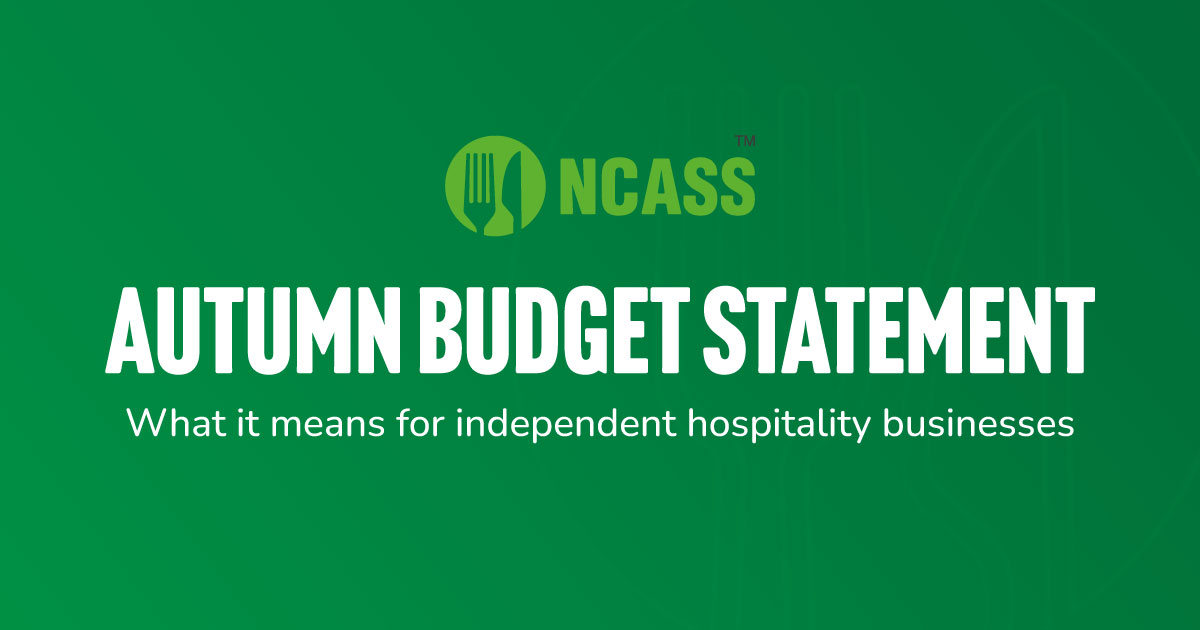Chancellor Rachel Reeves has today delivered Labour’s first budget for 14 years. While pledging there will be no return to austerity, the government has focused on funding public service boosts with increased tax stipulations.
For independent hospitality, this Autumn budget represents a missed opportunity. The sector has needed greater support from government for some time now and unfortunately still remains in that position. There have been lots of measures announced that directly impact business and in particular the hospitality sector – we’ve picked out the relevant measures and broken down exactly how these may affect you.
So what has been announced and how does it impact my business?
• One of the budget headlines is the increase to the national living wage. Rising 6.7%, this will take the minimum hourly wage from £11.44 to £12.21 per hour.
On top of this, the minimum wage for 18-20 year olds is increasing from £8.60 to £10, and for those aged 16 -17 minimum wage will rise from £6.40 to £7.55. Apprentices see an increase in pay too, with their wages increasing the same as 16-17 year olds.
• On top of those wage increases, employers are now facing a 1.2% increase in National Insurance contributions they must pay as the figure rises from 13.8% to 15%. Furthermore, the threshold at which businesses need to pay National Insurance on a worker’s earnings has come down from £9,100 to £5,000. This means businesses will have to pay NI on a higher percentage of their staff, and also that the amount of NI they pay will go up.
• However, the amount that employers are able to claim back on the NI they pay will more than doubled from April 2025 rising from £5,000 up to £10,500. This means a large number of small businesses won’t have to pay any NI contributions on a certain amount of staff, with an estimated 865,000 businesses not having to pay any NI contributions.
• Duty on draught alcohol drinks has been cut by 1.7% which provides a slight reprieve for relevant drinks serving businesses, although alcohol duty rates on non-draught drinks products are going up in line with the retail price index from February.
• Fuel duty has been frozen for another year, with the current 5p cut that had been due to end in April 2025 is retained.
• The existing business rates relief 75% discount (which applies in England currently) is due to expire in April, when it will be replaced by a lower 40% discount up to a maximum amount of £110,000. Reform on business rates has been promised, with a permanent lower business rate for retail, leisure and hospitality businesses to be implemented in 2026 onwards.
The bottom line is that these measures announced will cost businesses more to employ people, so it could pose a risk to job security. Effectively this is welcome news for employees, but for employers it places added strain on operating costs and will be more expensive to employ people of all ages. A second significant rise in the minimum wage in two years will be difficult for many small businesses to absorb.
Boosting employment conditions will make seeking gainful employment more attractive to the public, but the question is how sustainable this is for employers. The double whammy of wages increasing alongside higher NI contributions charges businesses with higher outgoings for their most vital commodity; staff. To afford this, they may be faced with passing costs onto customers through raising prices.
Many had hoped for further business rate relief extension and will be disappointed at what is going to be a 35% increase in expenditure on this front. There has been no amendment to the current VAT threshold either, something the sector desperately needs.
The full Autumn budget can be read here.
Nick Summers, MD, NCASS comments:
“Today’s budget is deeply disappointing, it missed the opportunity to the provide support that hospitality and NTE needs and will significantly impact the small and micro independent businesses that make up much of the foundational economy.
The measures put in place to support employees and employment allowance are positive. However, there has been no tax reform and business rates relief has decreased by 35%. In addition, increases to the National Living Wage, National Minimum Wage and employers National Insurance contributions could further damage any recovery for our industry.
Independent hospitality has suffered enough – without profit, we are merely tax collectors. Solutions such as hot food tax reform (hot food tax is discriminatory), a sliding scale for VAT and a meaningful VAT threshold increase has been ignored again. The Chancellor must engage with small and micro businesses urgently to avoid further irrecoverable loss. We will continue to lobby government, work with other associations and raise the profile of our members and the wider sector.”
If you would like to share your opinion of the Autumn budget with us please contact us via opinion@ncass.org.uk






 Featured Training
Featured Training
OUR MEMBERSHIP
We're here to help make your catering business a success. Whether that be starting up or getting on top of your compliance and marketing. We're here to help you succeed.
Want our latest content?
Subscribe to our mailing list and get weekly insights, resources and articles for free
Get the emails